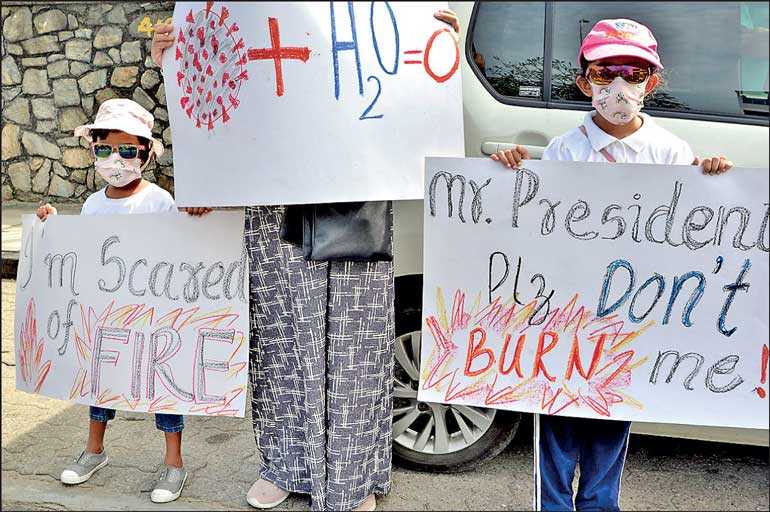Saturday Feb 14, 2026
Saturday Feb 14, 2026
Friday, 22 January 2021 00:00 - - {{hitsCtrl.values.hits}}

The Government must realise at least now that they have placed themselves in a serious predicament. The unprofessional manner in which they have handled the burial issue is inacceptable – Pic by Shehan Gunasekara
“God gives wisdom to anyone whom He wants. Whoever is given wisdom, certainly, has received much good. Only people of reason can grasp this.” (Quran 2/269)
This column attempts to address a different perspective on the burial or cremation disagreement. Therefore, no in-depth references will be made to science, myth or racism which are often associated  with the issue.
with the issue.
Focus is directed on the subjects of Procedural Justice and Social Justice. Though the word justice is used, it is not in relation to law or the legal system. The objective is to focus on these two areas in order to ascertain their psychological impact on the masses. In turn, to provide an understanding of the empirical changes in the perception about the President, Prime Minister and the Government. Extending the discussion further, crass deficiency in social justice locally can also have international ramifications.
The primary argument is built on the premise of the (Heta nama lakshaya) 69 lakh so-called Sinhala voter base and the domineering influence of a certain section of the monks (a handful). The Heta nama lakshaya is itself a flawed argument but not relevant to this column. Generally, Government decisions are taken based on merits but the issue of burial or cremation is a maverick exception to this norm. This is where the fairness of any deliberative procedure in the decision-making process has been compromised. Why so, perhaps to satisfy the arbitrarily decided preferred direction to suit the obstinacy of one or several. This is an inappropriate display of power but with a cost attached to it.
Psychological impact
Researchers studying the outcome of unfair decision-making have remarked on its psychological impact on the masses. Those who have experienced unfairness directly and, those who have witnessed it happening to others, begin to lose confidence in the Government and its top administrators.
The conditions for procedural justice have been recognised under six criteria: (a) consistent application, (b) lack of bias, (c) availability and use of accurate information, (d) ability to appeal and correct flawed decisions, (e) ethicality, and (f) representativeness. (Leventhal & Others, 1980).
The failure of the Government to consider these qualitative factors in policy formulation and being unfair and unjust prejudicially will shift loyalty. On 9 November 2020, the response to a web poll conducted (though not scientific) by the Daily Mirror provides some sense to the analysis of what the Government does and what the masses think that the Government is doing. To the question, ‘Do you feel that the Government has a clear and consistent policy to combat the current COVID-19 outbreak’, the response was a staggering 95.2%, “No”!
A major part of this dissatisfaction, inter alia, may be safely attributed to the burial and cremation issue which unnecessarily has invited wide national and international interest. The Government must realise at least now that they have placed themselves in a serious predicament. The unprofessional manner in which they have handled the burial issue is inacceptable.
Neural sensitivity to justice
The average person is not a scholar of procedural justice and the conditions which go to justify it. However, common sense prevails in the reasonable man. When people perceive decision-making procedures have not conformed to what is manifestly clear and just, the natural instinct of fairness and reasonableness are triggered. The example of the unsubstantiated and unscientific stand of the Government denying burial on the face of scientifically evidenced facts, is a case in point. Research has shown that when individuals perceive decision-making procedures as unfair, they express less commitment to the organisation administering them and a less willingness to engage in voluntary actions on the organisation’s behalf (Colquitt, 2001).
The Journal of Neuroscience of 19 March 2014 in a study of ‘Justice Sensitivity Predicts Neural Response ….’ notes as follows:
“Morality is a fundamental component of human cultures and has been defined as prescriptive norms regarding how people should treat one another, including concepts such as justice, fairness, and rights. This study provides important knowledge on how individual differences in justice sensitivity impact neural computations that support psychological processes involved in moral judgment and mental-state reasoning.” (Keith J. Yoder and Jean Decety).
When the people learn that they have been taken for a ride by the professionals and the authorities, the tide would obviously turn against them. This fact is proven by a recent web poll conducted by the same local newspaper the Daily Mirror on 12 December 2020. A whopping 81.9% voted in favour of allowing burial with restrictions. The level of disagreement earlier in terms of numbers against burial seems to have diminished. The diminution can be attributed to the availability of new evidence that burial is a safe mode of disposal of the COVID-19 infected deaths.
Social justice in politics
Social justice concerns are typically regarded to be moral concerns. Research reveals, for example, if someone is treated unfairly in a given society, people generally regard this to be morally wrong. Communication Psychology Professor Tobias Rothmund, writes, ‘Social justice depends upon procedures, norms, and rules that govern political decisions to preserve the basic rights, liberties, and entitlements of individuals and groups.’ (The Psychology of Social Justice in Political Thought …”).
Leventhal studies (ibid.) show that inconsistency in the application of policies, bias, inaccurate information, not correcting wrong decisions, lack of ethics all symbolises the direct conflict with the norm of procedural justices. The burial issue is an excellent case study in this regard because it has all these ingredients which defies procedural justice and social justice. They psychologically impact on the neural sensitivity to moral judgment and sense of justice in the people.
A subsequent web poll held by the Daily Mirror on 18 January 2021 accentuates this analysis. Here, it was asked that the Government in 2021 should focus on the following:
1) Conducting provincial council polls – 0.3%
2) Boosting tourism – 1.1%
3) Repatriating migrant workers – 2.8%
4) Obtaining COVID-19 vaccine – 8.2%
5) Resolve dispute over burial and cremations – 87.6%
A large majority (87.6%) had voted demanding a resolution to the dispute over burial and cremation. This gives an indicator of how important procedural and social justice are and the manner in which these can psychologically affect the thinking of the masses. The consequence will be that the President, Prime Minister and the Government before long will find the 69-lakh vessel almost empty due to the slow leakage from it.
Hyped-up nonsense
The religio-cultural and ethnic trauma that people experience due to basic human rights violations impact even on stable governance initiatives. It is good to stop this hyped-up nonsense of burial being a danger to the living humans. This lie cannot be sustained any further. If the Government does not act in time, the 69 lakhs will gradually dissipate based on the psychological sensitivity of the people to what should be fair, reasonable and just.
In this context COVID-19 infected cadavers should be allowed for burial secured as per the WHO and Ministry of Health guidelines. And, as per the wishes of the dead person or the family members, those who want to be cremated be allowed to do so.
Pansakula
Irrespective of whether it is a burial or a cremation, the Government should also allow the religious rituals to be conducted maintaining health guidelines. The Buddhists should be allowed to have their pansakula and other rituals for their beloved departed. Similarly, for all the other religions too. The unfounded and unscientific fear has to be kicked aside. Lies will have to be replaced with the truth and science be embraced. This should be the way of ensuring the rights of the living persons. The way to protect and respect the dignity of the dead person, who cannot fight for his rights.
To continue to deny this right to the people under the delusion of losing the heta nama lakshaya and the handful of monks is going to be costly. As stated earlier, this voter base will gradually fizzle off as more and more people begin to see the truth. A phenomenon that can be seen evolving with the availability of scientific evidence and the experts voicing their support for burial.
It has been said that the more political authorities are seen as satisfying the criteria for procedural justice, the more they are perceived as trustworthy, legitimate, and entitled to lead. The time is right for those in the Government to urge the Executive President to take a firm executive decision and permit burial. Such a firm decision will earn the respect of the heta nama lakshaya which is in fact, the critical mass.
The average reasonable man among the heta nama lakshaya at his own level also evaluates rules, procedures and systems to see if they are fair and just. They are all not fools. “There is an abundance of evidence that political authorities and institutions are viewed as more legitimate when they exercise their authority through procedures that people experience as fair.” (Leventhal 1980).
(Mass L. Usuf, Attorney at Law is a Former Corporate and Legal Advisor and can be reached via email: [email protected].)